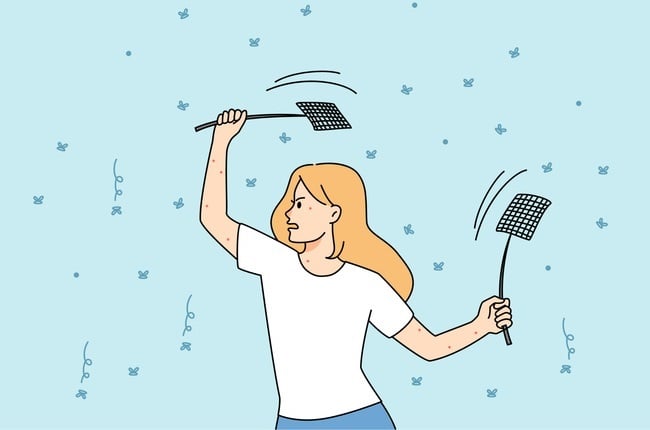
- Some people attract mosquitoes more than others, and for years, scientists have speculated why this happens.
- A new study provides strong evidence: 'mosquito magnets' tend to produce fatty acids in higher quantities than others.
- These acids become a 'heady perfume' that mosquitoes can't resist, and it's likely to remain this way.
- There may be a potential avenue out, although this remains to be tested.
You've tried all the anti-itch lotions and sprayed yourself head to toe in insect-repellent, but the pesky mosquitoes keep coming back to snack on your body.
If you ever wondered why you simply can't get these bloodsucking insects to buzz off, scientists say it's likely because you produce larger quantities of certain chemicals, tied to smell, that mosquitoes find attractive.
The study, published this month in Cell, explains how these fatty acids emanating from your skin create a "heady perfume" that mosquitoes simply can't resist.
A news release on the study explains:
Lead author Leslie Vosshall, head of Rockefeller's Laboratory of Neurogenetics and Behavior, adds: "There's a very, very strong association between having large quantities of these fatty acids on your skin and being a mosquito magnet."
Only female mosquitoes require blood meal
Both male and female adult mosquitoes feed on nectar, plant sap, or honeydew, but it is only the female mosquitoes that require a blood meal as it provides the essential protein needed for egg laying. The male's proboscis (nose) is also not strong enough to pierce the skin.
Mosquitoes can carry certain diseases, including the West Nile virus, malaria, dengue and the Zika virus, that may be passed on to people through their bites and lead to life-threatening illnesses.
Research by Boston University scientists this year revealed that mosquitoes have a bizarre sense of smell and that the unconventional way they process odours could help explain why they are so good at finding their human victims.
Other theories for mosquitoes biting some more than others
There have been a few popular theories for why some people get bitten more. They include your blood type, blood sugar level, consuming garlic or bananas, and being a woman, but many of them are not backed up with credible data, says Vosshall.
For the study, the team designed an experiment involving 64 volunteers who were asked to wear nylon stockings around their forearms for six hours a day to pick up their skin scents. This was repeated on multiple days. Aedes aegypti mosquitos, which spread diseases such as yellow fever and Zika, were used for this experiment.
READ MORE | 7 things worth knowing about mosquitoes
Over the next few years, the researchers placed their stockings in separate traps and in all possible pairings. Then, dozens of mosquitoes were released while the team observed rounds of robin-style 'tournaments'.
The mosquitoes would swarm towards a particular sample, labelled Subject 33. In fact, it turned out to be 100 times more attractive to the mosquitoes than the lowest attractor. "It would be obvious within a few seconds of starting the assay," says fellow researcher Maria Elena De Obaldia, adding:
All the stockings were sorted into high and low attractors so that the team could analyse what differentiated them via chemical analysis techniques.
The scientists discovered that the mosquito magnets produced higher levels of certain acids than their less-attractive counterparts. These substances are part of our skin's natural moisturising layer. They are used by the healthy bacteria that live on our skin to produce our unique human body odour, the authors explain.
In follow-up experiments, Subject 33 was still the most alluring to the pesky insects.
Once a mosquito magnet, always a mosquito magnet
We hate to be the bearer of bad news, but Subject 33 remained the most attractive over time – meaning if you're a mosquito magnet, you're likely to remain one.
"Some subjects were in the study for several years, and we saw that if they were a mosquito magnet, they remained a mosquito magnet," says De Obaldia. "Many things could have changed about the subject or their behaviours over that time, but this was a very stable property of the person."
READ MORE | Malaria-carrying mosquitoes go for the feet and ankles - so how do you protect yourself?
The results were not what the scientists expected. "The goal was a mosquito that would lose all attraction to people or a mosquito that had a weakened attraction to everybody and couldn't discriminate Subject 19 from Subject 33. That would be tremendous," Vosshall says, as it could lead to the development of more effective mosquito repellents. "And yet that was not what we saw. It was frustrating.
"There may be a way out, but it's all speculative since that experiment hasn't been done, Vosshall notes.
For now, she and her colleagues hope their findings will inspire researchers to test other mosquito species, including in the genus Anopheles, which spreads malaria, adds Vosshall: "I think it would be really, really cool to figure out if this is a universal effect."




 Publications
Publications
 Partners
Partners











